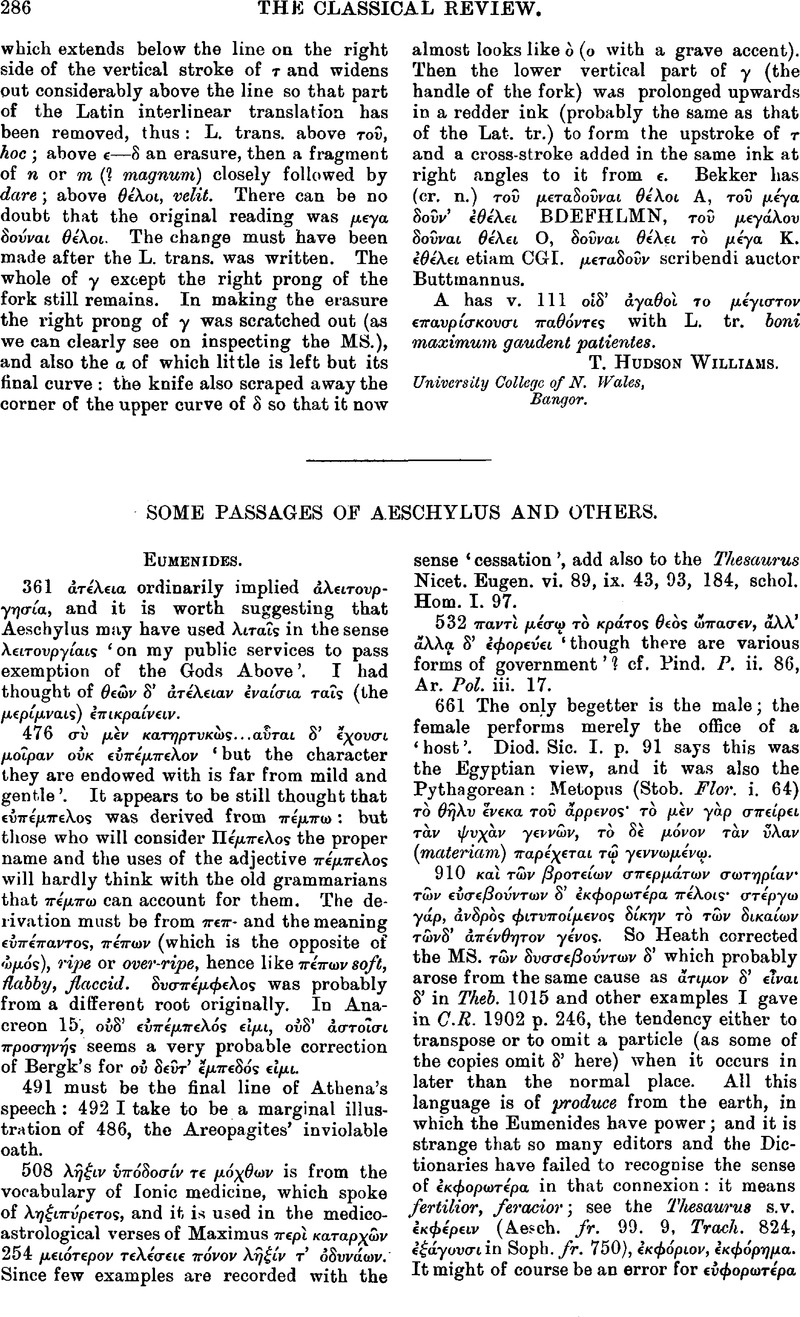No CrossRef data available.
Article contents
Some Passages of Aeschylus and Others
Published online by Cambridge University Press: 27 October 2009
Abstract

- Type
- Original Contributions
- Information
- Copyright
- Copyright © The Classical Association 1903
References
page 287 note 1 Darmesteter Zend-Avesta I p. lxiii ‘The same myth in the Vedas was described as a feat of Traitana or Trita Âptya, ‘Trita, the son of waters,’ who is both in the Vedas and in the Avesta a name of the fire-god, as born from the cloud in the lightning. The same tale is told in the same terms in the Avesta: Thraêtona Âthwya killed the fiendish snake…’ There surely you have the origin of Ἀθνη, which is merely a feminine form like Σελν, Ἀλκμνη (C.R.1901 p. 402), and of ![]() , (and Τιθρώνη?): she is the feminine this Trita or Thrita (who in many respects corresponds to Apollo, see ib. p. 219). For αἰγς and αἰχμ, which as the ‘spear’ remained Athene's attribute, see ib. p. lxvii.—cf. Ebeling, Lex. Hom. s.v. Ηριτογνεια.
, (and Τιθρώνη?): she is the feminine this Trita or Thrita (who in many respects corresponds to Apollo, see ib. p. 219). For αἰγς and αἰχμ, which as the ‘spear’ remained Athene's attribute, see ib. p. lxvii.—cf. Ebeling, Lex. Hom. s.v. Ηριτογνεια.
page 287 note 2 Does this oracular phrase imply that the general, the common herd of men will be wasted and reduced before the capture of the walls?
page 288 note 1 Henry V iii, 2 ‘For Pistol, he hath a killing tongue and a quiet sword; by the means whereof a breaks words and keeps whole weapons'.
page 288 note 2 ![]() : cf. Anacharsis in Lucian ii. 912.
: cf. Anacharsis in Lucian ii. 912.
page 288 note 3 Eur. Ion 205 ![]()
page 289 note 1 This, I suspect, is actually the derivation of βραβες: it is merely ‘a wand-bearer.’ For the initial Aeolic β we may compare ![]() .
.
page 289 note 2 L. Dindorf in Thesaur. s.v. φοδεω: ‘Insidior. Aquila Psalm. 5. 9 ![]() . Pro quibus LXX
. Pro quibus LXX ![]() . Clem. Al. Protr. p. 4
. Clem. Al. Protr. p. 4 ![]() . insidiantes is the meaning, certainly; and you will obtain that meaning in the Greek when you have restored ϕεδροντας in both places.
. insidiantes is the meaning, certainly; and you will obtain that meaning in the Greek when you have restored ϕεδροντας in both places.
page 289 note 3 MS. γργορον.
page 290 note 1 Plat. Protag. 329 A ![]()
page 290 note 2 ‘Returned from the field’ as Ag. 608, Thesm. 1169. π στρατο in Ag. 543 means the same, but is commonly misunderstood.
page 291 note 1 Archil. 9. 5 7 ![]() .
.
page 291 note 2 The MSS. vary between δμων and δμον and are otherwise corrupt: I suspect δ' εἶσι was a misreading of ἔξεισι (cf. Agam. 1189,1564, 1570, Med. 1248), and οὐκ an insertion to make sense; if, that is, the meaning was ‘the Erinys will leave the house’; if it was ‘will not come to the house’ we must read δμους or δμους. The MSS. of the three popular school-plays, the Prometheus, Persae, and Seven against Thebes, are not all derived from the Medicean.
page 291 note 3 Weil reads ![]() and that is any case the meaning; see Paroem. II p. 80–2 Leutsch for the proverb
and that is any case the meaning; see Paroem. II p. 80–2 Leutsch for the proverb ![]() , Lucian i. 756, and Aristotle Index s.v. μσος for βλτιστν.
, Lucian i. 756, and Aristotle Index s.v. μσος for βλτιστν.
page 292 note 1 Cf. Bacchyl. 8. 35: there is a v.l. συμμαχα, but the particle then should have been δ.
page 292 note 2 Those who will refer to Poll. ii. 172–3, Greg. Cor. p. 548, Soph. fr. 539, Cobet V.L. 135, N.L. 310, Blaydes Acharn. 217 will see that the true reading may be μφἰπλικτοι: it is the same word I suppose originally (Lat. plico), though the senses often as in ![]() ‘the fork,’ correspond to those of the English split.
‘the fork,’ correspond to those of the English split.
page 292 note 3 Theophrast. H.P. v. 3. 3. μαν (loose-grained) ![]() : see iii. 13. 4.
: see iii. 13. 4.
page 292 note 4 As I conjecture for ![]() : ‘by the fire of the potter's furnace.’
: ‘by the fire of the potter's furnace.’
page 292 note 5 What could ![]() mean in Eupolis fr. 439 Kock (Pollux 6. 18
mean in Eupolis fr. 439 Kock (Pollux 6. 18 ![]() is from σττω): I could understand
is from σττω): I could understand ![]() ‘strained’ (=ὑλτης), or ςτακτς: Hesych.
‘strained’ (=ὑλτης), or ςτακτς: Hesych. ![]() .
.
page 293 note 1 Supposing that the text has not been mutilated; for in many places the text of Theognis seems to have suffered from being carelessly abridged.
page 294 note 1 φσκειν in Soph. El. 9, O.T. 462, Phil. 1411, is Ionic for νμιζε or δκει.
page 295 note 1 This I had from Dr. Henry Jackson years ago, who had it as he told me from Shilleto, who derived it probably from Heimaun; see the quotation from him in Greg. Cor. p. 864.—In Latin Comedy, translating Greek, ne with the present imperative is not uncommon, ne fle, ne plora for ![]() but I fancy Latin normally preferred to say noli flere.—In Herodas iv. 52 our choice is therefore limited to
but I fancy Latin normally preferred to say noli flere.—In Herodas iv. 52 our choice is therefore limited to ![]() (W. R. Paton) or καρδιηβολε.
(W. R. Paton) or καρδιηβολε.


